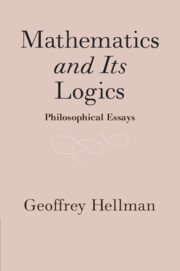Book contents
- Mathematics and Its Logics
- Mathematics and Its Logics
- Copyright page
- Contents
- Acknowledgements
- Introduction
- Part I Structuralism, Extendability, and Nominalism
- Part II Predicative Mathematics and Beyond
- 7 Predicative Foundations of Arithmetic
- 8 Challenges to Predicative Foundations of Arithmetic
- 9 Predicativism as a Philosophical Position
- 10 On the Gödel–Friedman Program
- Part III Logics of Mathematics
- Index
- References
7 - Predicative Foundations of Arithmetic
from Part II - Predicative Mathematics and Beyond
Published online by Cambridge University Press: 26 January 2021
- Mathematics and Its Logics
- Mathematics and Its Logics
- Copyright page
- Contents
- Acknowledgements
- Introduction
- Part I Structuralism, Extendability, and Nominalism
- Part II Predicative Mathematics and Beyond
- 7 Predicative Foundations of Arithmetic
- 8 Challenges to Predicative Foundations of Arithmetic
- 9 Predicativism as a Philosophical Position
- 10 On the Gödel–Friedman Program
- Part III Logics of Mathematics
- Index
- References
Summary
Predicative mathematics in the sense originating with Poincaré and Weyl begins by taking the natural number system for granted, proceeding immediately to real analysis and related fields. On the other hand, from a logicist or set-theoretic standpoint, this appears problematic, for, as the story is usually told, impredicative principles seem to play an essential role in the foundations of arithmetic itself. It is the main purpose of this paper to show that this appearance is illusory: as will emerge, a predicatively acceptable axiomatization of the natural number system can be formulated, and both the existence of structures of the relevant type and the categoricity of the relevant axioms can be proved in a predicatively acceptable way.
- Type
- Chapter
- Information
- Mathematics and Its LogicsPhilosophical Essays, pp. 103 - 116Publisher: Cambridge University PressPrint publication year: 2021

